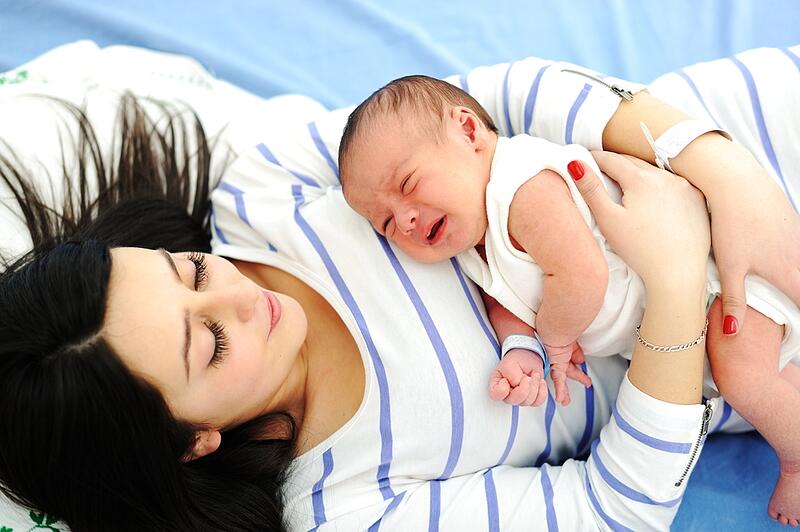
If you (like millions of other parents) have some issues with the sleep of your newborn, or you are a to-be-parent awaiting your meeting with the child, study the five popular myths and truths about baby sleep carefully prepared by sleep experts. These facts will probably give you a better idea of what to expect from baby sleep and how to make it better.
Myth #1: Newborns Sleep Soooo Much
A popular myth that infants need nothing but eat, sleep, and diaper changing during the first weeks (and even months) of their lives often misguides parents of a newborn. Overall, it is true as newborns indeed need some time to adapt to the new environment after living for 9 months in a cozy, convenient mother’s womb. But the famous saying “sleeps like an infant” has nothing to do with reality, and you’ll need to put up with it as soon as you get acquainted with your much-loved baby.
Why could a newborn not sleep, you may wonder? Reasons are numerous.
Most newborns have problems with their gastrointestinal system as they stop feeding via the mother’s placenta and have to start eating breast milk. The change is fundamental, so many babies feel infantile colic, which disturbs their sleep tremendously. The worst about it is that you have a limited arsenal of tools to ease their discomfort, except for comforting your baby, breastfeeding and cuddling them, doing some therapeutic massage, and waiting for the first 3-4 months for the colic to go away. Another problem may be the wrong temperature or humidity level in your apartment. Besides, infants may sleep little because of the postpartum adaptation they go through together with their parents.
Myth #2: Breastfeeding Helps Put Your Baby to Sleep
Many mothers are overly confident that breastfeeding can solve all the sleep problems for their babies. Indeed, research proves that breastfed newborns sleep better because of the lower pressure on their gastrointestinal system. Besides, breastfeeding always acts as a soothing, comforting action putting babies to sleep quicker. However, here is the catch: your baby may FALL asleep quicker, which doesn’t mean that they will sleep well as soon as you leave. So, if you plan to put your baby to sleep with breastfeeding and then put them in bed, going to do your household chores, work, or home assignments, that expectation couldn’t be farther from the truth.
Myth #3: Newborns Sleep Much Better in Strollers
Parents experiencing problems with their newborns’ sleep at home may resort to the age-old method – putting their babies into strollers and taking them for a walk for the newborns to get several hours of healthier sleep. On the one hand, the method works well for many parents and babies, with the latter falling asleep better in the physical limitations of clothing and stroller. However, it is not a universal rule, with some babies never tolerating strollers.
Many parents complain of their babies’ screams and scandals once they see strollers. So, if your baby is one of such free personalities, don’t exhaust yourself and the newborn.
Myth #4: Sleep Whenever Your Baby Sleeps and You’ll Be OK
What should an exhausted mother do when she doesn’t sleep at night and has to do some housework and childcare activities in the daytime? Experienced parents advise going to sleep together with the baby, be it morning, noon, or evening. But does it work that well for young parents? Not exactly, as a person’s resourcefulness is not counted in the hours of sleep per day, but in the non-interrupted sleep duration during which hormones work correctly.
So, it’s much healthier to strive to get more hours of night sleep by keeping to a correct baby regime than to sneak 1-2 hours of sleep at different times of the day.
Myth #5 Newborns Fall Asleep Once They Are Tired
This myth is not only wrong but also hazardous for your child’s health. In fact, infants fall asleep longer and sleep worse if you extend their awake time beyond the reasonable regime. To have your baby sleep well in the daytime and at night, develop a consistent schedule for staying awake and sleeping; your baby will adapt quickly, and you’ll be able to plan your time accordingly.
As you can see, having a newborn is highly stressful, mostly in terms of sleep deprivation. So, if you are a student combining childcare with studies, it’s better to have a trusted companion to support you in the hardest times. Click this site to find dependable academic help. You’ll really need it for the periods of colic, toothing, and other issues of happy parenthood.
Pediatric Sleep Troubles
A good night’s sleep is essential to the growth and development of children, and children require much more sleep than adults. Sometimes however, children are unable to get the necessary amounts of nightly sleep that they need, and it can sometimes be attributed to a sleep disorder.
At The Alaska Sleep Clinic we provide consultation and therapeutic management for a wide variety of pediatric sleep disorders. We understand that your child’s health is important to you and we want to assure you that our Board Certified Sleep Physicians are highly adept at treating child sleep disorders.









